Calling Us To Becoming

Part of a yearlong series on Torah wisdom about building and builders.
In this week’s Torah portion, Shemot, Moses has an encounter with the bush that burns but is not consumed. A Voice speaks to him from the bush, telling him to go to Pharaoh and demand freedom for the children of Israel.
 When Moses asks who shall he say is sending him, God responds אהיה אשר אהיה / ehyeh asher ehyeh — sometimes translated “I Am That I Am,” or “I Will Be What I Will Be,” or “I Am Becoming What I Am Becoming.” In this name of God there’s a deep message for us as builders.
When Moses asks who shall he say is sending him, God responds אהיה אשר אהיה / ehyeh asher ehyeh — sometimes translated “I Am That I Am,” or “I Will Be What I Will Be,” or “I Am Becoming What I Am Becoming.” In this name of God there’s a deep message for us as builders.
When Torah names God’s-self as “I Am Becoming What I Am Becoming,” Torah teaches us that God is infinite becoming, infinite change, the One Who Is Becoming Itself. And we who are made in the divine image (Genesis 1:27) partake in this divine quality of becoming. We too have the capacity to be creating, and building, and growing, and renewing, and becoming.
We who seek to build the future of Judaism need to be attuned both to our own becoming (our personal / internal / spiritual growth and change), and to the becoming and change that are part of Judaism’s growth and renewal in every age. An overfocus on our own personal becoming can feed a spiritual narcissism that’s all about “me, me, me” — which is why we need to ensure that our own becoming is in service of that larger becoming to which the Jewish future calls us.
 Tradition teaches that in every era “the Voice continues to sound from Horeb.” (1 Kings 19) Revelation wasn’t a singular thing that happened once and then was done. It’s always happening, as God is always becoming, as we are always growing and listening and receiving. Reb Zalman z”l used to say that God broadcasts on all channels — and we receive that broadcast when we attune ourselves to the Voice that continues to sound.
Tradition teaches that in every era “the Voice continues to sound from Horeb.” (1 Kings 19) Revelation wasn’t a singular thing that happened once and then was done. It’s always happening, as God is always becoming, as we are always growing and listening and receiving. Reb Zalman z”l used to say that God broadcasts on all channels — and we receive that broadcast when we attune ourselves to the Voice that continues to sound.
And as we attune to that broadcast, we’ll hear the call to grow and change and build: not for the sake of ego, but for the sake of the future of Judaism itself. In every age, it’s incumbent on us to build a Judaism that’s authentic, balancing ancient with new. In this age, one of the calls we hear is to build a Judaism that embraces all gender expressions. That’s some of our tradition’s “becoming” that couldn’t be fully expressed in earlier eras — but we can build that Judaism now.
We can build a Judaism that truly uplifts all of our various diversities as reflections of the Infinite in Whose image we are made. We can build a Judaism that balances backward-compatibility with innovation, not for innovation’s own sake but for the sake of a Jewish future that’s open to the holy’s renewing flow. And we can build a Judaism that’s profoundly ethical not only in word but in deed, a Judaism that centers the obligation to protect the vulnerable from abuse.
 The future of Judaism is always under construction, and we all have a role to play in building it, if we’re willing to listen for the Voice that calls us to integrity and to the hard work that integrity demands. God told Moses (Ex. 3:5) to take off his shoes because the place where he was standing was holy. In the Baal Shem Tov’s teaching, that verse instructs us to remove our habits. What are the old habits we need to shed in order to be ready to build and to become?
The future of Judaism is always under construction, and we all have a role to play in building it, if we’re willing to listen for the Voice that calls us to integrity and to the hard work that integrity demands. God told Moses (Ex. 3:5) to take off his shoes because the place where he was standing was holy. In the Baal Shem Tov’s teaching, that verse instructs us to remove our habits. What are the old habits we need to shed in order to be ready to build and to become?
Just as God is always-becoming, so must our Judaism be always-becoming. Never static; always growing toward being a greater expression of our highest values. One of the values that animates us at Bayit is radical inclusivity as we seek to build a Judaism that can sustain our hearts and souls even in changing times. When you tune your inner radio to the Voice that continues to sound from Sinai (and from the burning bush), what values call you to build?
What do you want your Judaism to be becoming?
By Rachel Barenblat and Shoshanna Schechter. Sketchnotes by Steve Silbert.

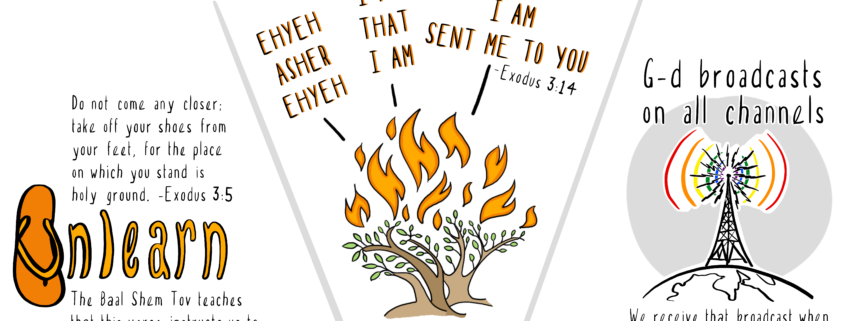
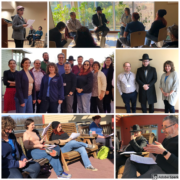
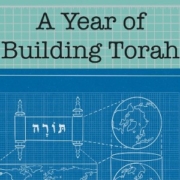

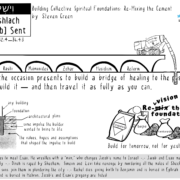
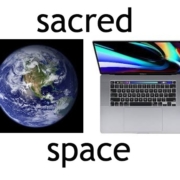
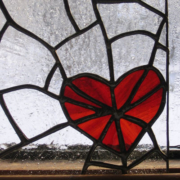


Trackbacks & Pingbacks
[…] Calling Us To Becoming […]
Comments are closed.